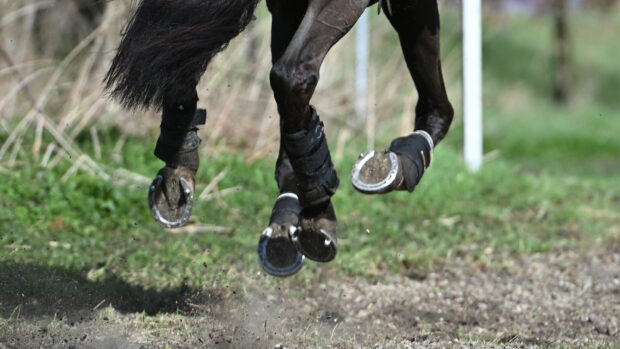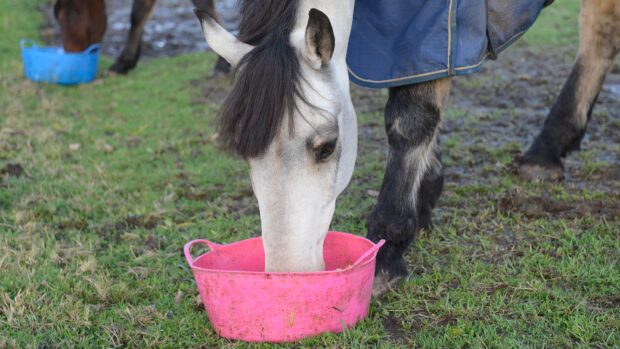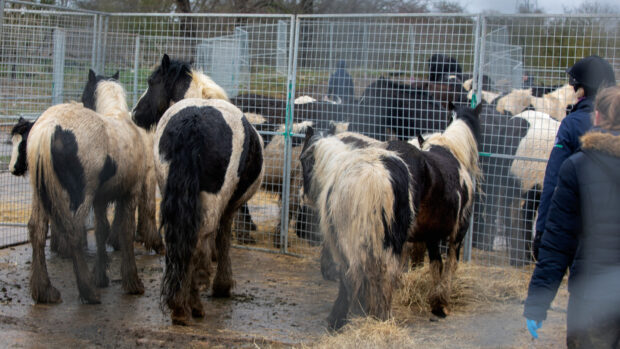The rider of a horse who badly broke a leg at a show but was left without painkillers until blood had been taken for dope-testing has spoken up in hope that a similar situation will never occur again.
Belgian rider Ann Carton’s 12-year-old mare Kai Licha de Carmel went lame between fences at an event in the Netherlands last Friday (24 June). Ann told H&H she knew immediately something was very wrong.
She was on a normal stride between the second and the third fence when Ann felt her lose all power in her left hind. She pulled up immediately, and although the mare was non weight-bearing on the limb, Ann hoped she could be treated.
“When you see the X-rays, it was kind of like an explosion,” she said. “We really tried to save her as she could have had a nice life in the field but the vets in the clinic, and our own vet, said it was impossible. Her leg was in so many pieces, she’d have been helpless for the rest of her life.”
Ann said the show staff were on hand immediately, and wanted to help, and that the treating vet wanted to sedate Kai.
“But then the official FEI vet came and said, in a really cold way, no, it wasn’t possible; the horse couldn’t have any pain relief or sedation before she’d taken blood for the doping control,” she said. “For us, it was ridiculous. To think the horse we loved was standing on three legs, suffering, and the vet was just thinking about doping control; we couldn’t believe it. The FEI vet said she had to get her suitcase to get the stuff to take blood and she was away about 15 minutes.”
Ann estimated the time between the incident and the horse finally receiving treatment as about 25 minutes.
“We asked six or seven times if we could give the horse something; she was sweating, it was terrible to see,” she said.
The mare had to be put down, and Ann’s husband Filip Grootjans wrote an open letter to the FEI calling for the rule to be changed.
“Our dear Kai had finally to be euthanised. It is a shame that by following cold rules in a non intelligent and emotionless way, our best friend had to suffer so hard in her last moments,” he wrote.
Ann said the FEI replied to say the rule should not have prohibited Kai’s being given pain relief or sedation, and that it had been interpreted wrongly.
“They said it was the wrong interpretation of the rule and if a horse is suffering, they can help but no one else reacted,” she said. “Not the foreign judge, the chief steward, no one. They all thought the vet was right. “But we don’t want the vet to be the only one responsible. We were very angry with her at that moment but it’s not just her fault; it’s the system that’s wrong.”
Ann wants the FEI to ensure that all vets and officials know that alleviating a horse’s suffering is the priority.
“When a rule is more important than a horse’s welfare, that’s wrong,” she said. “We don’t want to make this a fight against the FEI; we want them to realise that attitudes must change and that this case — how bad it was for us and our horse who we loved so much — should never happen again.
“The first reaction must be ‘How can we help this horse?’ not ‘How do we react because of the rules?’
“If I’m at a show and my groom does something wrong, I get yellow-carded because it’s my responsibility but now there’s this problem and the FEI says it’s the vet. But it’s important the FEI takes responsibility and, as a federation, makes a change in minds.”
An FEI spokesman told H&H the federation was aware of the incident and “from the onset has been really concerned about the circumstances which led to an unnecessary delay in the administration of sedatives and pain relief to the severely injured horse Kai Licha de Carmel prior to being euthanised”.
“It is upsetting, and we empathise with the owner, athlete and support personnel, and extend our deepest sympathies for this distressing situation and the loss of their horse,” she said.
“We have reached out to the owner of the horse to express our sympathies and reassure them that we would look into this further to understand how this happened and of course take appropriate action to ensure this does not happen again.
“Equine welfare is at the heart of our endeavours, and we promote and insist on procedures and protocols that place the horse’s best interest first. There can be veterinary reasons behind a decision not to administer sedatives immediately, especially where there is some hope that the injury, such as a fracture, can be treated without having to resort to euthanasia. In such cases, the immediate administration of sedatives can make a horse less stable and runs the risk that the horse may stumble/fall causing further or more serious injury. In this case this was a particular concern since Kai Licha de Carmel was to be transported to a referral clinic and had to be loaded in very challenging conditions with heavy rain and risk of slipping. This is a medically and ethically valid cause for delay. However, there was also a further delay due to misconception of the FEI rules.”
The spokesman said it is important to clarify that FEI rules do allow painkillers and/or sedatives to be given before a sample is taken, before a horse is put down.
“This procedure is correctly applied by FEI veterinarians around the world whenever the situation arises,” she said. “The reason we require equine anti-doping/controlled medication samples to be taken from any horse that is euthanised at an event is to ensure there was no substance in the horse’s system that might have led to or concealed an injury that might have contributed to the incident.
“In this case, there was clearly a misunderstanding around the FEI rules and procedures, and we will proactively address this with all officials as a preventative measure. But it is also important to point out that being a veterinary official, and having to take a difficult decision in a very stressful and often emotional situation such as this, can be extremely challenging and demanding.
“We are very sorry Kai-Licha de Carmel suffered, nobody wants a horse in their care to suffer – and we certainly don’t want a horse to suffer from any misinterpretation or misapplication of our rules.
“For those that call for reprimand or sanctions against the officials concerned, we do not believe this is the appropriate response. Yes, errors were made but we can and will all learn from them. As aptly suggested by the owner, we will be focussing on education and communication to remind our Officials of the FEI rules and procedures and to show our support for their incredible commitment and the work they do every day.
“As a final note in this sad situation, which we all agree must be avoided going forward, we would like to call on the community to show some compassion with the officials involved and not resort to online bullying, which is extremely harmful and stressful. Mistakes can be made, and we must learn from these mistakes and move forward together as a united community.”
You might also be interested in:

Rider’s shock as horse who died at Liverpool tests positive for ketamine
‘Ketamine is an anaesthetic; of course you couldn’t ride on it, it’s stupid to think you could jump a 1.50m

Subscribe to Horse & Hound magazine today – and enjoy unlimited website access all year round
Horse & Hound magazine, out every Thursday, is packed with all the latest news and reports, as well as interviews, specials, nostalgia, vet and training advice. Find how you can enjoy the magazine delivered to your door every week, plus options to upgrade your subscription to access our online service that brings you breaking news and reports as well as other benefits.




